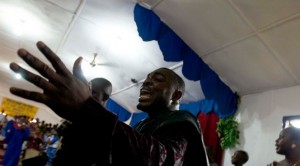

By Ray Pride Pride@moviecitynews.com
On Predicting Sundance Bests
 Predicting film festival bests isn’t my game. But I am hopeful for surprises like a couple years back when, toward the end of Sundance, Robert Koehler is urgently telling me to run, don’t think, go directly to an end-of-festival presser for Man On Wire. (Thank you, Bob.) I’d gotten the same pleasure from being at the very first press showing of Once and then gabbling to anyone I hoped would listen. Go! Discover! In the week’s run up to Sundance 2011, I’ve liked posts by programmers and reviewers and filmmakers that aren’t about impressing a 140-character opinion in one sharp tweet of the cheeks. For instance, Toronto’s Cameron Bailey (@cameron_tiff) hits the ground happy: “Sunshine, snow, SUVs, excessive cheer. Hello Park City!” A keen reminder to get out of doors and read those tweets while waiting for the shuttle to get to headquarters for that badge…
Predicting film festival bests isn’t my game. But I am hopeful for surprises like a couple years back when, toward the end of Sundance, Robert Koehler is urgently telling me to run, don’t think, go directly to an end-of-festival presser for Man On Wire. (Thank you, Bob.) I’d gotten the same pleasure from being at the very first press showing of Once and then gabbling to anyone I hoped would listen. Go! Discover! In the week’s run up to Sundance 2011, I’ve liked posts by programmers and reviewers and filmmakers that aren’t about impressing a 140-character opinion in one sharp tweet of the cheeks. For instance, Toronto’s Cameron Bailey (@cameron_tiff) hits the ground happy: “Sunshine, snow, SUVs, excessive cheer. Hello Park City!” A keen reminder to get out of doors and read those tweets while waiting for the shuttle to get to headquarters for that badge…
 This afternoon, Movieline solicited from attendees three films they wouldn’t dream of leaving Sundance without seeing, and sleep-deprived that I am already, fished out three sincere replies. Top of mind is the premiere I’m seeing in six hours about three miles out to the far edge of town at the Temple Theater, Steve James and Alex Kotlowitz‘s The Interrupters. James is a consummate observer and collaborator, and his work with nonfiction ace Kotlowitz holds promise. Its 161-minute running time suggests the Kartemquin crew is going for the same kind of observational, longitudinal work looking at superficially troubled communities, such as Hoop Dreams, to name but one fine film James has made. Braden King‘s earlier work, including Dutch Harbor, builds off rhythmic accretion, a sense of the land, a drenching sonic texture. Why not make a movie like HERE, about a geolocator gone astray in Armenia? (Plus, it’s shot by Lol Crawley, whose credits include Ballast.) Two years ago, one of the co-directors of The Redemption Of General Butt Naked [pictured, top] told me the story at a Sundance event in 2008. My reaction was physical: I leapt up and looked around the room for people to introduce her to, someone who might know someone who could get this amazing story brought to completion. The title is provocative, but the tale, well, if it matches what I heard…
This afternoon, Movieline solicited from attendees three films they wouldn’t dream of leaving Sundance without seeing, and sleep-deprived that I am already, fished out three sincere replies. Top of mind is the premiere I’m seeing in six hours about three miles out to the far edge of town at the Temple Theater, Steve James and Alex Kotlowitz‘s The Interrupters. James is a consummate observer and collaborator, and his work with nonfiction ace Kotlowitz holds promise. Its 161-minute running time suggests the Kartemquin crew is going for the same kind of observational, longitudinal work looking at superficially troubled communities, such as Hoop Dreams, to name but one fine film James has made. Braden King‘s earlier work, including Dutch Harbor, builds off rhythmic accretion, a sense of the land, a drenching sonic texture. Why not make a movie like HERE, about a geolocator gone astray in Armenia? (Plus, it’s shot by Lol Crawley, whose credits include Ballast.) Two years ago, one of the co-directors of The Redemption Of General Butt Naked [pictured, top] told me the story at a Sundance event in 2008. My reaction was physical: I leapt up and looked around the room for people to introduce her to, someone who might know someone who could get this amazing story brought to completion. The title is provocative, but the tale, well, if it matches what I heard…













